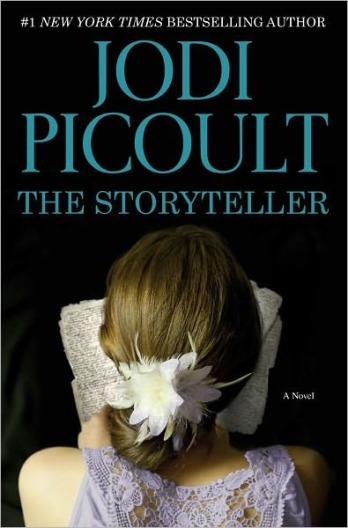
“I have not mentioned Josef to my grandmother for good reason. She has spent over six decades keeping her memories bottled up. But as I leave Josef’s house, I cannot help but wonder if my grandmother is one of the ones he can’t recall. And if he is one of the ones she has worked so hard to forget.”
Jodi Picoult is an author of 23 novels. Her book, The Storyteller, is one of her 23 novels that have made it to the #1 bestsellers list. The Storyteller is an historical fiction about World War 2, the Holocaust. Sage Singer is a night time baker working at The Daily Bread, on one of her usual nights working, she befriends an old man, Josef Weber, who is beloved by their community. He is everyone’s favourite retired teacher who has also coached the Little League. One day, Josef asks Sage for a favour: to kill him. Shocked, Sage refuses leading to Josef confessing his deepest, darkest secret: He was a Nazi SS guard; therefore, he deserves to be dead. Adding to the complication, Sage’s grandmother is a Holocaust survivor.
I started reading this book on the recommendation of one of my bestfriends & I’m SO glad I read it, I love it. This book has become one of my favourite books! I was not even a little surprised by how good this book was, Jodi Picoult has done it again. The book is divided into 3 parts: the first part expresses Sage’s life as a night time baker & a woman in a relationship with a married man who is the town’s funeral director. Additionally, it also portrays how Josef & Sage meet, which is through a grief group that they have in common. Over time their friendship blossoms, they become close enough that Josef asks Sage to help him die. Obviously shocked as hell, Sage refuses but he insists, to convince her, he relays the story of his life as a Nazi SS guard. As he keeps telling her the story, Sage decides to get in contact with the police so that maybe they would arrest him because murder does not have a statute of limitations. She ends up being connected to Leo who works in the Department of Justice. From there part 2 begins, which is Minka’s (Sage’s grandmother) story of during the Holocaust. Part 3 is about when Leo decides to find a way to get Josef to be identified by Minka or get him to confess, which happens by the end. The book is written incredibly, reading about Minka’s life in a women’s camp & all the terror that she has faced was so interesting to read about. Josef’s constant plead for forgiveness from Sage led her to have a conversation with Mary that gave me something I really liked:
“Forgiving isn’t something you do for someone else. It’s something you do for yourself. It’s saying, You are not important enough to have a stranglehold on me. It’s saying, You don’t get to trap me in the past. I am worthy of a future.”
Watching history repeat itself might be self-defeating, but there’s usually another reason that survivors keep their experiences to themselves.
Like?
To protect their families. It’s PTSD, really. Someone who’s been traumatised like that can’t switch off some emotions and leave others intact. Survivors who look perfectly fine on the outside can still be emotionally empty at the core.
Other quotes that I loved from the book:
“We are capable of doing what we least expect. I always knew what I was doing, and to whom I was doing it. I knew, very well. Because in those terrible, wonderful moments, I was the person everyone wanted to be.”
“They can take away my home,” he said. “And my money,, and my wife, and my child. They can take away my livelihood and my food and”- here his voice hitched – “my grandson. But they can’t take away my dreams.”
“I was just another prisoner, another number. If I had to die in this hellhole, and the odds were very good that would happen, then maybe someone else would survive and tell their children the story a girl had told at night in the block. Fiction is like that, once it is released into the world: contagious & persistent. Like the contents of a Pandora’s box, a story that’s freely given can’t be contained anymore. It becomes infectious, spreading from the person who created it to the person who listens, and passes it on.”
Rating: 💎💎💎💎💎